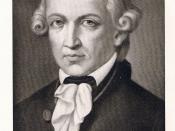According to Kant, feeling of obligation is a moral feeling, a respect for the moral law. It has no external source and it is not imposed. The notion of obligation comes from us as rational, free beings. Human reason and freedom can only be source of moral law that is universal and binds everybody. Feeling of obligation cannot come from our knowledge-oriented experience because principles that directs the will in our relationships with objects are subjective ones and therefore a universal moral law cannot come form them. Second, it cannot come from basic principles such as cogito because these ideas stay above human reason and cannot be known and represented. Thirdly, because moral law can only come form us as rational, free human beings, we decide what we ought to do and we are not imposed what we must do.
Feeling of obligation cannot be derived from our experiences with objects because in our relationships with objects we use our subjective maxims and it cannot be raised to a moral universal law.
Moral law determines our will and reason is the ground for determining our will. Moral law is finding out what among our wills can serve as a universal principle for our moral action. Will is always conditioned by objects and nature around us. When we will something and transfer it into action, the principle that determines our will is only valid for us. Kant calls these kinds of principles maxims. There is no consensus among maxims. We always start with maxims whenever we will something. However, a moral law must be valid for everyone. Thus, we should be able to translate our subjective maxim into an objective law and make it valid for everyone. Kant expresses this idea in these words: ?So act that the maxim of your will always hold at the same time as the principle giving universal law?. There are practical principles for wills whose determining ground are objects. Our experiences with these objects are based on pleasure or pain we get from these objects. In that case, will is based on something external and is determined by an object, which is expected to give satisfaction. That kind of will is based on self-love. While turning this will into action, we place ourselves higher than others caring about our own satisfaction. However, what people seek from the experiences with these objects, their expectations are different from each other. Thus, such principles, which presuppose an object, cannot be universally binding. If morality is based on such principle, it would differ among people and wills of people would contradict. Thus, knowledge-oriented experience cannot be a basis for our feeling of obligation. According to Kant, to gain knowledge we have to start with an object and knowledge cannot occur without experience. However, as long as we make our decisions in the realm of experiences, we cannot raise our maxim to a moral law. The only thing holds the maxim to pure will, a universal law regardless of natural laws or what inclination we have is the human reason. In that case, our will is a pure will independent of any empirical condition and is conditioned by the mere form of law.
Feeling of obligation cannot be deduced from a basic principle such as Plato?s idea of Good or Descartes? cogito because such ideas are not knowable and representable and they are above human reason and autonomy. According to Kant anything independent from experience, unconditional cannot be known and represented. Knowledge always starts with an object, then our human mind provides conditions, which are time and space, to make this object perceivable. Knowledge occurs when we connect this perception to a concept by our judgments. Therefore, we cannot take an idea that is unconditional, beyond experience and try to represent it out of space and time. Such principles like the idea of Good and cogito refer to something unconditional, independent from experience, out of space and time. Therefore, they cannot be represented. Innate knowledge about Good and cogito, independent from space and time is impossible. These ideas can be thinkable but cannot be known, represented. Because such ideas cannot be known, morality can no longer be depended on such principles. Also, since they are innate, they do not come from human reason and are above human freedom, if morality is based on them then our feeling of obligation will become a must rather than a sentiment.
According to Kant we as rational, free beings decide what we ought to do without imposition of society or other external sources telling us what we must do. There is only one idea in human mind among all ideas of reason which has a positive content in it and therefore, we can have knowledge about independent from experience. It is freedom. Freedom is unconditional but we know the effects of freedom, which are so called spontaneous actions. These actions have no preceding cause than our will. Freedom is the basis of reason. Reason itself is a desire to go beyond experience and conditional. It is an expression of freedom and they are inseparable. Reason alone, which is uniquely independent from experience, is able to create a moral law, which is valid for everyone. Moral law is actually based on the autonomy of reason, freedom. It is only dependent on us as free, rational beings. Although, due to their needs people have contradicting wills with the moral law, they feel obligated within constrain of reason. This compulsion is offered by our practical reason, which deals with our will, it is not raised from subjective causes. There is no other principle according to which we make our moral decisions. Our feeling of obligation is not imposed but comes from our higher-selves. Our respect to moral law comes from our own nature as a rational being. Because morality is no longer related with objects, our satisfaction from them, there is no things we must do in order to reach them. We do things only because we as rational beings think they are moral or immoral without concerning the pleasure or pain they give to us. We are no longer concerned with objects and we have gained our autonomy. We decide as rational, free beings in the realm of freedom what we ought to do.
To sum up, according to Kant, feeling of obligation, which is a respect for moral law, cannot be derived from knowledge-oriented experience. To gain knowledge about something we always have to start with an object. However, the principle that directs our will in our relationships with objects is subjective. In these relationships, we seek for the satisfaction that object will give us and our principle is only valid for us. However, a moral principle should be a universally binding law. Therefore, feeling obligation cannot come from our knowledge-oriented experience. Also it cannot be deduced from first principles such the idea of Good or cogito. These ideas are said to be beyond experience and unconditional. However, according to Kant something has to be experienced and conditioned in space and time in order to be known. Thus, such innate ideas cannot be known because they cannot be represented in space and time and morality cannot be based on them. Thirdly, because we as rational, human beings decide give our moral decisions regardless of satisfactions objects give to us, our morality is not imposed to us. We decide by ourselves what we ought to do and we are not imposed what we must to do.





